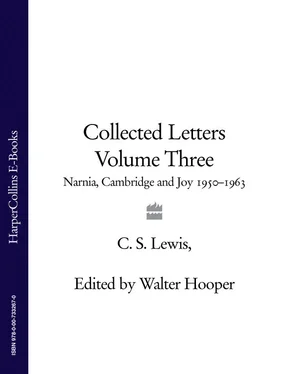In the parable of the Sheep & Goats (Matt. XXV. 31 and following) those who are saved do not seem to know that they have served Christ. But of course our anxiety about unbelievers is most usefully employed when it leads us not to speculation but to earnest prayer for them and the attempt to be in our own lives such good advertisements for Christianity as will make it attractive.
(5.) 242 It is Christ Himself, not the Bible, who is the true word of God. The Bible, read in the right spirit and with the guidance of good teachers will bring us to Him. When it becomes really necessary (i.e. for our spiritual life, not for controversy or curiosity) to know whether a particular passage is rightly translated or is Myth (but of course Myth specially chosen by God from among countless Myths to carry a spiritual truth) or history, we shall no doubt be guided to the right answer. But we must not use the Bible (our fathers too often did) as a sort of Encyclopedia out of which texts (isolated from their context and not read without attention 243 to the whole nature & purport of the books in which they occur) can be taken for use as weapons.
(6.) Kill means murder . I don’t know Hebrew: but when Our Lord quotes this commandment he uses Gk phoneuseis (murder) 244 not apokteinein (kill) 245
[(7.)] 246 The question of what you wd. ‘want’ is off the point. Capital punishment might be wrong tho’ the relations of the murdered man wanted him killed: it might be right tho’ they did not want this. The question is whether a Xtian nation ought or ought not to put murderers to death: not what passions interested individuals may feel.
(8.) 247 There is no doubt at all that the natural impulse to ‘hit back’ must be fought against by the Xtian whenever it arises. If one I love is tortured or murdered my desire to avenge him must be given no quarter. So far as nothing but this question of retaliation comes in ‘turn the other cheek’ is the Christian law. It is, however, quite another matter when the neutral, public authority (not the aggrieved person) may order killing of either private murderers or public enemies in mass. It is quite clear that our earliest Christian writer, St Paul, approved of capital punishment—he says the ‘magistrate’ bears & should bear ‘the sword’. 248 It is recorded that the soldiers who came to St John Baptist asking, ‘What shall we do?’ 249 were not told to leave the army. When Our Lord Himself praised the Centurion 250 He never hinted that the military profession was in itself sinful. This has been the general view of Christendom. Pacifism is a v. recent & local variation. We must of course respect & tolerate Pacifists, but I think their view erroneous.
(9.) 251 The symbols under which Heaven is presented to us are (a) a dinner party, 252 (b) a wedding, 253 (c) a city, 254 and (d) a concert. 255 It wd. be grotesque to suppose that the guests or citizens or members of the choir didn’t know one another. And how can love of one another be commanded in this life if it is to be cut short at death?
(10.) 256 Whatever the answer is, I’m sure it is not that (‘erased from the brain’). When I have learnt to love God better than my earthly dearest, I shall love my earthly dearest better than I do now. In so far as I learn to love my earthly dearest at the expense of God and instead of God, I shall be moving towards the state in which I shall not love my earthly dearest at all. When first things are put first, second things are not suppressed but increased. If you and I ever come to love God perfectly, the answer to this tormenting question will then become clear, and will be far more beautiful than we cd. ever imagine. We can’t have it now.
(11.) 257 Thanks v. much: but I haven’t a sweet tooth.
(12.) 258 Not that I know of: but I’m the last person who wd. know.
(13.) 259 There is a poor barber whom my brother and I sometimes help. I got up one day intending to go to him for a hair-cut preparatory to going to London. Got a message putting off London engagement and decided to postpone hair-cut. Something, however, kept on nagging me to stick to it–‘Get your hair cut.’ In the end, said ‘Oh damn it, I’ll go.’
All good wishes.
Yours
C. S. Lewis
TO GEOFFREY BLES (BOD): TS52/42.
Magdalen College,
Oxford.
10th November 1952.
My dear Bles
I return Mr. Dell’s letter. 260 I don’t think there’d be any point in republishing Spirits in Bondage . I don’t remember the ‘sermon in the midlands’, 261 but it was probably made from notes, and is now irrecoverable. There are, of course, several short pieces in prose and verse (from Spectator, Punch, Time and Tide etc.) which might be used some day.
I’m glad to hear the Dawn Treader goes on well.
Yours
C. S. Lewis
TO MARY WILLIS SHELBURNE (W):
Magdalen College,
Oxford
Nov. 10th 1952
Dear Mrs. Shelburne
It is a little difficult to explain how I feel that tho’ you have taken a way which is not for me 262 I nevertheless can congratulate you—I suppose because your faith and joy are so obviously increased. Naturally, I do not draw from that the same conclusions as you—but there is no need for us to start a controversial correspondence!
I believe we are very near to one another, but not because I am at all on the Rome-ward frontier of my own communion. I believe that, in the present divided state of Christendom, those who are at the heart of each division are all closer to one another than those who are at the fringes. I wd. even carry this beyond the borders of Christianity: how much more one has in common with a real Jew or Muslim than with a wretched liberalising, occidentalised specimen of the same categories.
Let us by all means pray for one another: it is perhaps the only form of ‘work for re-union’ which never does anything but good. God bless you.
Yours sincerely
C. S. Lewis
TO J. R. R. TOLKIEN (P): 263
[Magdalen College]
Nov 13/52
My dear Tollers
Just a note to tell you with what agreeable warmth and weight your yesterday’s good news lies on my mind—with an inward chuckle of deep content. 264 Foremost of course is the sheer pleasure of looking forward to having the book to read and re-read. But a lot of other things come in. So much of your whole life, so much of our joint life, so much of the war, so much that seemed to be slipping away quite spurlos 265 into the past, is now, in a sort made permanent.
And I am of course very glad on your account too. I think the very prolonged pregnancy has drained a little vitality from you: there’ll be a new ripeness and freedom when the book’s out. And how pleased Priscilla 266 and Mrs. Farrer will be. 267 God bless you.
J.
TO MRS D. JESSUP (W):
Magdalen College,
Oxford
Nov. 13th 1952
Dear Mrs. Jessup
Yes, of course I will—for all six of you. I am very sorry to hear that your (temporal) news is so grim. Your spiritual news is perhaps better than you think. You seem to have been dealing with the dryness (or ‘the wall’ as you well name it) in the right way. Everyone has experienced it or will.
It is clearly what G.M. meant when he said ‘Have pity on us for the look of things , When desolation stares us in the face. Although the serpent-mask have lied before , It fascinates the bird.’ 268
It is v. important to remember that Our Lord experienced it to the full, twice—in Gethsemane when He sweated blood, and next day when he said ‘Why hast thou forsaken me?’ 269 We are not asked to go anywhere where he has not gone before us. The shining quality may come back when we least expect it, and in circumstances which wd. seem to an outside observer (or to ourselves) to make it most impossible. (We must not reject it, as there is an impulse to do, on the ground that we ought , in the conditions, to be miserable).
Читать дальше












